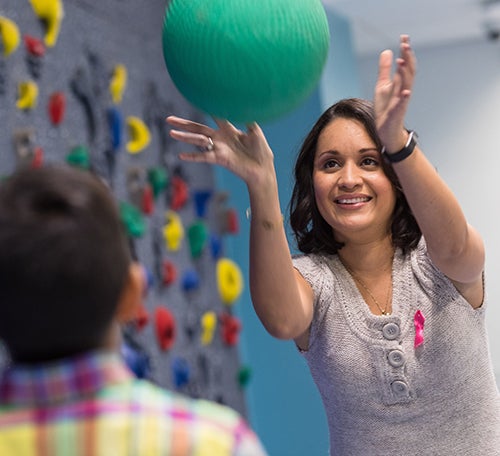ADDRESSING DISPARITY
Grants help provide breast health services for area women
Claudia Ferrufino-Sosa was just 28 when she was diagnosed with breast cancer. Now, at age 33 and cancer-free, she’s sharing what she’s learned about the importance of early detection with other younger women.
“When you’re in your 20s you’re not expecting to be diagnosed with cancer,” she said. “I wish that before I was diagnosed I had somebody like me right now, somebody that could educate me.”
Ferrufino is one of 19 women trained at East Carolina University over the past two years to serve as community breast health educators through a grant from the Susan G. Komen North Carolina Triangle to the Coast Affiliate. Supported by this grant and two additional Komen awards, ECU faculty members and their partners have educated, assessed, screened and treated more than 1,000 eastern North Carolina women for breast cancer.

Ferrufino-Sosa, a breast cancer survivor, and her eight-year-old son Daniel.” title=”Ferrufino-Sosa, a breast cancer survivor, and her eight-year-old son Daniel.
Each of the projects emphasizes reaching uninsured or underinsured Latina and African-American women. This targeted group has a higher mortality rate when diagnosed with breast cancer, according to the Komen regional affiliate. Although breast cancer incidence among minority women is lower when compared to white women in Pitt County, the mortality rate is twice as high for minority women.
In other words, minority women have less breast cancer but are dying at higher rates.
“That shouldn’t be happening,” said Dr. Alice Richman, who leads the health education grant with fellow College of Health and Human Performance professor Dr. Essie Torres. “They come in late to care for whatever reason — poverty, racism, lack of access — there’s a lot of things going on that cause this disparity.”
The ECU programs are designed to cut through those factors.
The educators — breast cancer survivors, ECU students and local residents — conduct breast health educational sessions at clinics, churches and community events. A breast cancer screening initiative provides clinical breast exams and mammograms completed by College of Nursing and Leo W. Jenkins Cancer Center faculty and staff. A third grant helps provide lower-cost treatments at Jenkins Cancer Center.

Daniel Ferrufino-Sosa tosses a ball with his mom, Claudia.
The initiatives are aimed at providing more than the average breast health services. For the screening grant, a patient navigator — a faculty member or student intern — initially speaks with the women on the phone, schedules their screening and meets them at their appointment. Extra assistance also comes in the form of interpretation services, child care and transportation assistance.
“Transportation is a barrier,” said Dr. Kathryn Verbanac, professor of surgery at the Brody School of Medicine and co-director of the screening grant, which was originally funded in 2013. “We don’t recognize how much energy it takes for some people to get care; women don’t always have ready access to transportation to attend a clinic or cannot attend during their work day.”
The team at the screening clinics also routinely connects women with the health department and resources to seek care for other health needs. While they found that women are on average five years overdue for a mammogram, organizers also noted that their patients lack access to other routine services such as pap smears.
“We need to identify women with breast cancer earlier so they need far less treatment than they would otherwise,” said Dr. Ann Schreier, associate professor in the College of Nursing and co-director of the screening grant. “Early screening is so important in terms of health care.”
The projects are about “giving that whole picture of help to a woman,” Richman said.
“A lot of times something is free and when people don’t show up we say, ‘Why aren’t women here?’ We’re getting them education and service and following up. We’re really helping them, not just blaming women for not being screened.”
Two local radiology providers, Eastern Radiology and Carolina Breast Imaging, provide low-cost services to make the screening clinics possible.
Education, screening and treatment assistance are available through the end of March. For more information, contact Torres at 252-328-1818 or torrese@ecu.eduor Richman at 252-328-6431 or richmana@ecu.edu.
